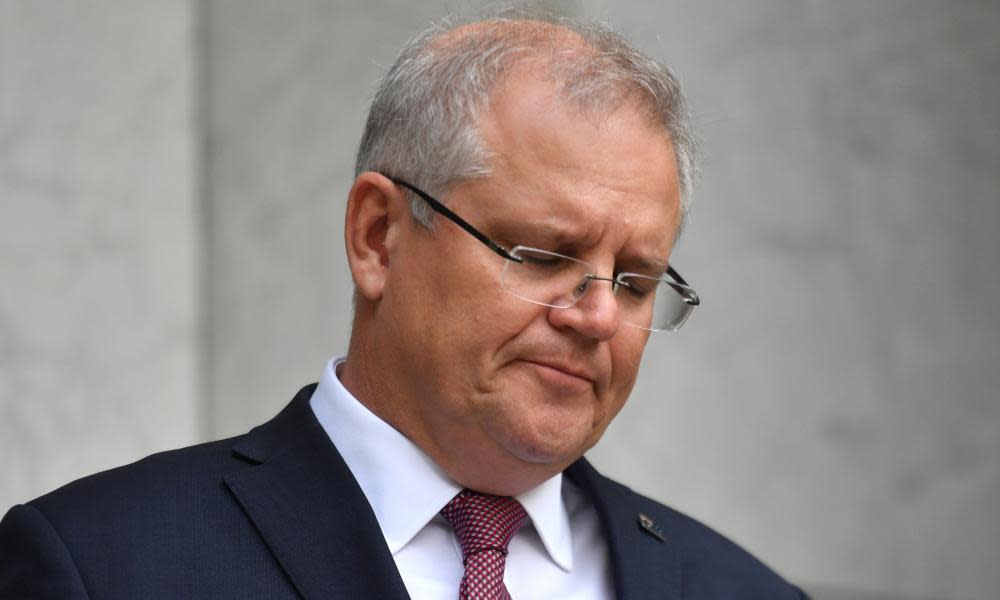Australians becoming more anxious about coronavirus threat, Essential poll finds

Australians are becoming more anxious about the threat of the coronavirus, with 53% of the latest Guardian Essential poll sample saying they are now very concerned, which is a 14 point increase in only a week.
While one-third of people in last week’s poll declared there was an overreaction to the threat of Covid-19, the number of people nominating themselves in the sanguine category halved this week. Last week 33% of the sample had that view. This week, that’s down to 18%.
While a substantial number of people in last week’s sample were apparently unmoved by the evidence of rising numbers of infections, and a growing number of fatalities, 28% of the sample of 1,086 voters held the opposite view. They worried the threat of Covid-19 had been under-estimated by the community and by government. This week, that number has risen to 43%.
The increase in community concern from last week to this week is driven by women, and capital city residents, with infection rates substantially higher in the capitals than elsewhere in the country. It coincides with governments becoming much more blunt about public health messages, and with stringent social distancing measures restraining people’s capacity to engage in normal activities.
Consistent with public health messaging starting to cut through, a growing number of people in the sample report changing their behaviour during the outbreak. Last week, 88% of the sample reported changing their behaviour in some way to reduce the risk of infection, and that has climbed to 95% this week.
There is also strong community support for the restrictions that have been imposed to minimise health risks, with 88% support for closing Australia’s borders to other countries, 82% support for making direct payments to people who have lost work due to Covid-19, 81% support for closing pubs, clubs, restaurants and cafes, 80% support for closing borders between Australia’s states and territories, and 80% support for making direct payments to small and medium business who have lost income.
Closing schools is the only measure where the response was slightly more equivocal, with 69% supporting a shift to distance learning. That percentage was consistent among respondents whether they had children or whether they didn’t.
Last week saw thousands of job losses associated with public health restrictions, with Australians lining up outside Centrelink offices looking for support. A quarter of the sample say they are worried about losing their job during the pandemic, and 19% of respondents report losing paid work.
Younger people (between 18 and 34) are more likely to report losing work than the cohort aged 35 to 54. Just under a quarter of the sample say they will struggle with any loss of income, but will get by, while 20% say they will be in serious financial distress if there is a short-term loss of income associated with the pandemic.
With many temporary visa holders thrown into limbo during the crisis, and at real risk of destitution without work or benefits, just over half the sample (54%) say they would support non-permanent residents accessing Australian government support if they lose their jobs as a result of the Covid-19 outbreak.
While there have been complaints about confusing messaging during the crisis, 63% report feeling informed, and 56% say they trust the information governments are providing.
Last week’s survey suggested voters had very low trust in information being reported in the media, with only 35% trusting the media to give them honest and reliable information about the pandemic. There has been a rebound this week, but off a very low base, with 42% saying they trusted media information.
The latest poll comes as the number of confirmed coronavirus cases stands at 4,200, and 18 Australians have lost their lives.
The Morrison government on Monday unveiled a $130bn support package with a new JobKeeper payment – a wage subsidy designed to keep Australians in work. That expenditure, which builds on two previous economic stimulus packages worth $17bn and $66bn, will be unleashed over the next six months.
Scott Morrison met the premiers on Monday night and the national cabinet agreed to maintain and enforce the social distancing restrictions currently in place. Queensland, New South Wales, Victoria and the ACT are policing rules that now restrict gatherings to two people, down from 10.
But states are also continuing to reserve their rights to impose more restrictions over the coming period.
In a statement issued after the meeting, Morrison disclosed the factors that would lead to a change in the current level of restrictions. The factors include the overall number of new cases, and particularly the rate of change; the proportion of locally acquired cases without known links to other cases; multiple outbreaks in vulnerable populations, including remote Indigenous communities and residential aged care facilities; and the capacity of laboratory testing and the health system to respond to current and predicted load.
Morrison said in the statement advice from the chief medical officer indicated the scaled up social distancing measures over the past week meant “Australia has now achieved significant behavioural change and that the message to stay at home unless doing limited essential activities is being heeded”.
“It is clear the epidemiology curve is beginning to flatten,” the prime minister said. “But it is too early to determine whether such movements will be significant or sustained”.
“Stronger adherence to social distancing and new quarantine arrangements for returned travellers will take a number of days to show maximum effect. The biggest single concern remains the evidence of cases where there are no known local links”.
The latest results from the Guardian Australia survey will be discussed at an online forum on Tuesday.

 Yahoo News
Yahoo News 
